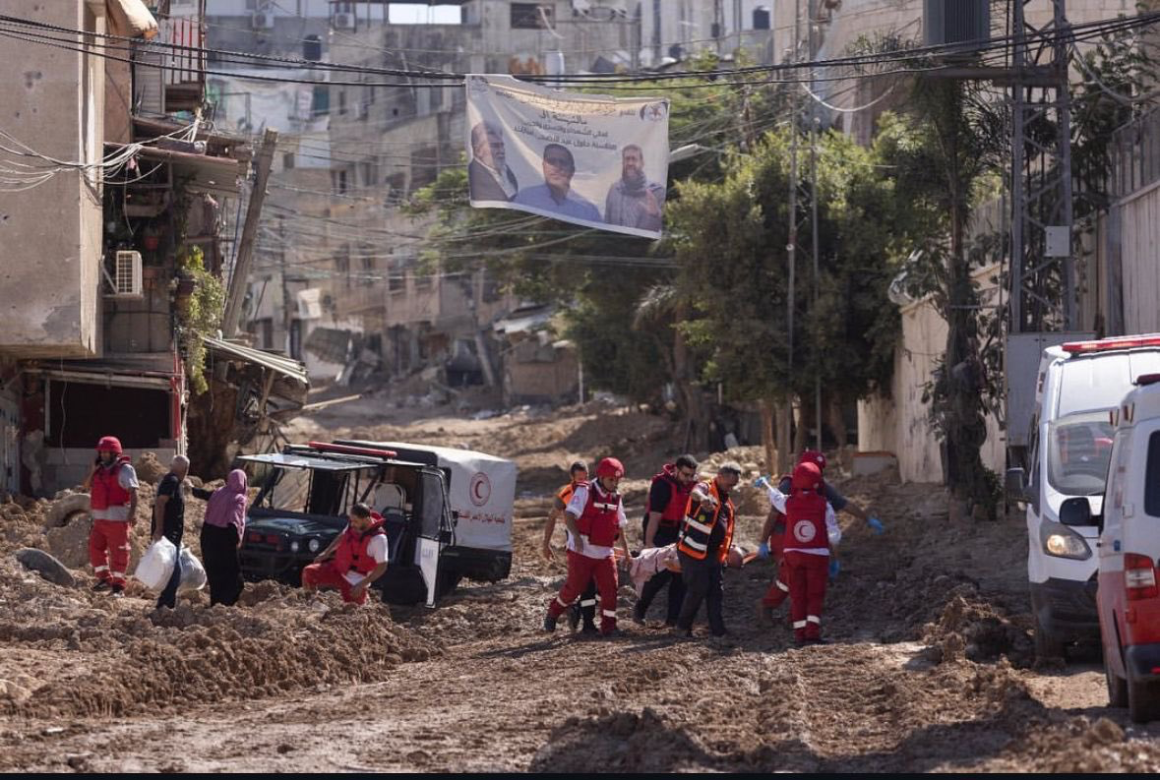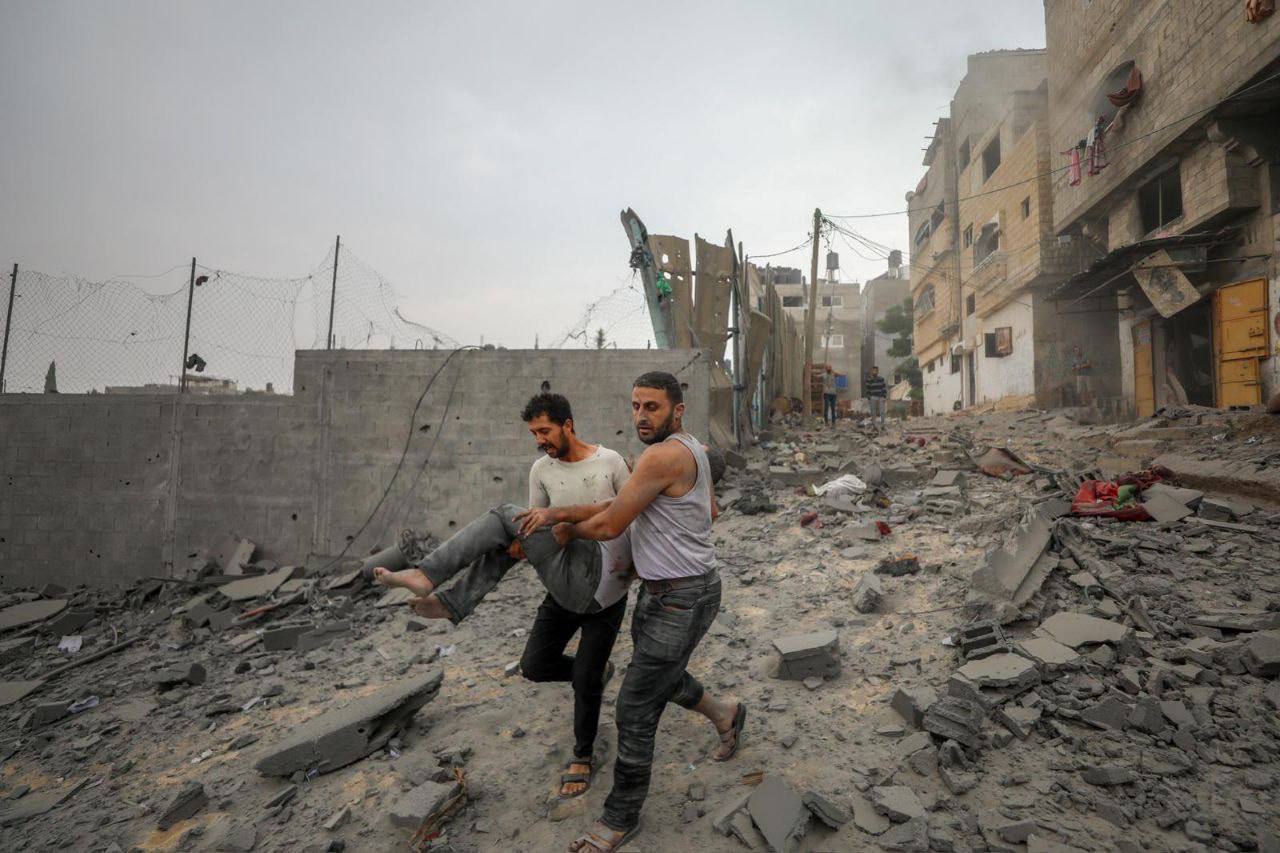For Palestinians in Qatar, a year since the start of Israeli onslaught on the Gaza Strip evokes grief, helplessness, and guilt.
It has been exactly one year since Ahmed Zayed last saw all of his family members together.
After waking up to the news of the surprise and unprecedented Hamas attack on Israel on October 7 last year, Zayed spent seven agonising hours trying to connect a video call to northern Gaza from his home in Doha.
Zayed recalls the “excitement and pride” felt on both sides as they watched footage of bulldozers dismantling security fences, igniting hopes of a Gaza that could one day be free from the constraints of an open-air prison.
Having been brought up in the Gaza Strip, Zayed, a student at Georgetown University in Qatar (GU-Q), could recognise the sound of explosions and warplanes in the background even through the video call.
“My feelings were mixed with fear,” the 24-year-old tells Doha News. “I could see that my dad was hopeful, but his eyes were also hiding fear. It was like we all knew what was coming, that Israel was going to hit us hard. I knew that most likely my family was never going to be the same.”
A year on, Zayed has lost family members and friends and seen his family get displaced because of Israeli strikes that “defy imagination” in the neighbourhood of Beit Lahia, where he spent his childhood.
In January 2024, his father, Awad Hasan Zayed, succumbed to injuries sustained from an Israeli air strike, despite multiple attempts of evacuation.
“Losing someone in this genocide is worse than losing someone in normal circumstances in so many ways,” he said, adding that he has felt helpless at times for the past year having had to watch it all from a distance.
“I still have not gotten the proper chance to grieve. If you’re lucky, you’ll get the chance to bury your loved ones. Otherwise, you do not even get to know where their grave is.”
A homeland lost
Zayed came to Doha after a video interview of his younger self with Al Jazeera did rounds, in which he called for the international community’s attention during the 2008 Israeli assault on Gaza.
He vividly remembers the places he made childhood memories in, before the deadly 2008-2009 war that saw Israel kill at least 1400 Palestinians including 300 children — locations that have now been reduced to rubble.
“The shops, the streets, mosques, my house, my grandfather’s house, and the balcony that we used to climb up on and act as if we were riding a ship or an aeroplane – they’ve all gone now,” he said.
“It is not only a genocide against us,” Zayed explained. “It’s against everything that represents us. Memories, feelings, love and humanity — everything is being genocided in Gaza.”
Bushra Heikal, a university student in Doha, used to visit Tulkarem in the occupied West Bank every year before the Israeli offensive on Gaza started. The trips allowed her to reconnect with her roots and experience the realities her parents faced before they moved to Qatar in search of better opportunities.
“My parents were raised there,” she says. “The connection does not only stem from the fact that I’m a Palestinian but also the fact that my parents have experienced the occupation.”
Last week, an Israeli air attack on the same refugee camp where her parents grew up killed 18 people and destroyed an entire neighbourhood, as Israel’s offensive continues to intensify in the occupied West Bank.

Survivor’s guilt
Seeing people of her homeland being killed has evoked “helplessness, anger, and survivor’s guilt” for most of the last year, Heikal says.
Studies related to survivor’s guilt, a response when people survive a traumatic event or situation that others did not, call it a “complicated grief” that makes moving on and getting back to a state of normalcy difficult.
“Having to see this footage of your home and your neighbours, wailing in pain because you’re not there to support them — it makes you feel guilty,” Heikal said.
Both Heikal and Zayed have struggled with their daily routines, finding it increasingly challenging to cope while witnessing Israel’s aggression against Palestine from a distance.
However, Heikal believes that bearing witness to the massacre, which has claimed over 41,000 lives in the Gaza Strip—widely regarded as an undercount—is equally important.
“I don’t believe that we should feel comfortable when genocide is happening. I understand that at a certain point, you get desensitised. It’s emotionally exhausting. But I always try to reconnect and remember that these are human beings and they’re not just numbers,” she says.
For Zayed, witnessing the ongoing situation over the past year has been exhausting and burdensome, leaving him feeling “helpless”.
“I want to reach out to every single person I know and love from Gaza and ask how they’re doing, but I don’t want to,” he said. “I know they’re not fine and the worst thing is, I cannot help them. There’s nothing that I can do to stop what is happening.”
‘Existence is resistance’
However, both students agree that advocating for the Palestinian cause from afar needs to be continued, despite personal losses and the continuing violence against Palestinians.
“”This genocide has shown us that weakness would only lead to more death, to more pain, to more suffering,” Zayed says.
“We should survive the values, the ideas, and the cause that our martyrs sacrificed themselves for. My father was martyred and a lot of his qualities and beliefs live through me, as do [those of] a lot of my martyred friends.”
For Heikal, the continuing offensive, which Israel has now expanded to attacking Lebanon, Syria, and Yemen, has exposed the West’s double standards as well as the failure of Arab states to intervene.
“I am prouder than ever to be a Palestinian now,” she says. “Especially because we continue to resist despite all this dehumanisation and the world turning a blind eye on us.”
“Our existence is a form of resistance,” she added.







